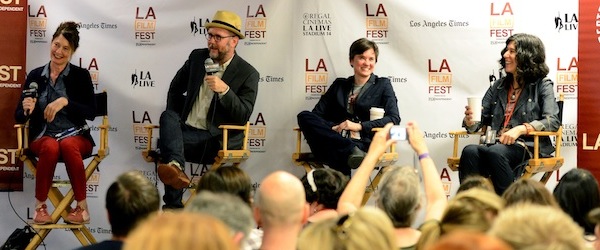Making a Movie Is Like Getting a Tattoo—Insights from Trailblazing Directors

“I fall in love with my main character…and that’s how it all begins,” director Kimberly Peirce said at the Coffee Talks: Directors panel discussion at the 2014 Los Angeles Film Festival, during which four trailblazing independent filmmakers— Valerie Faris and Jonathan Dayton, the married directing team behind Little Miss Sunshine, Kimberly Peirce (Boys Don’t Cry) and Debra Granik (Winter’s Bone)—shared their insights into topics such as character, acting, sound and screenwriting.
On the importance of compelling characters
When she was researching material and trying to find inspiration for her first film, a lot of time passed before Peirce discovered Brandon Teena’s tragic story. This would be the subject for her breakthrough, acclaimed debut Boys Don’t Cry. “I thought, maybe I can write and direct [Brandon Teena] in a way that will give back the life that was taken away.”
All of the filmmakers spoke about the importance of compelling, unique, well-developed characters in storytelling. Jonathan Dayton noted that comedy can often be born out of a character’s chaotic environment, saying that someone else’s onscreen pain becomes humorous for an audience.
Debra Granik said she loves to write characters that she doesn’t understand, and confessed an attraction to“characters who aren’t represented enough”—a true testament to her independent spirit.
Peirce warned that it is just as important to fully understand and sympathize with the antagonists of a story. When she was making Boys, she felt she had to do justice to Brandon Teena’s murderer, even though he committed such a heinous crime. She couldn’t understand how someone could rape and kill another human and felt compelled to educate herself as much as possible about that character, representing his character just as much as the hero’s.
On the impact of sound
The natural sounds that accompany the moody Winter’s Bone sparked a conversation about how a score can make or break a movie. Granik exclaimed she doesn’t appreciate how so many movies tell the audience how to feel with sound, pointing out that a lot of Hollywood scores make the audience feel like they are on a leash, and being pulled in whatever direction the sound effects want you to go, instead of just naturally feeling the emotions the images provoke.
Valerie Faris and Jonathan Dayton said they decided to go big with score on their project Ruby Sparks to accentuate the inner struggle of their main character, though Faris added that “music doesn’t help comedy” and won’t make something funny if it isn’t.
Peirce says sound is all about immersing yourself in the natural world, and knowing what to look for before you get to set. “Your movie starts to be born, and then you follow it.”
On coping with tight budgets
“Get real with yourself about what you don’t need. Restrictions are good.” Peirce said that sometimes you have to get rid of your favorite material for the sake of the project, and that often first-time filmmakers overshoot and run the risk of going over budget by trying to capture “everything.”
The same can be said for screenwriting. All of the filmmakers agreed that a “big, thick screenplay” is nobody’s friend in the industry, and it’s important to trim the fat before letting people read it.
“There is a benefit to working with limitations,”said Faris, suggesting that if you have a tighter budget, you learn to focus on what’s really important. She also added that documentaries are great practice because you learn how to tell a story, often with one camera in one space.
On working with actors
Peirce believes “the actor is our greatest instrument.” She spent five years studying acting, even though she knew it wasn’t the career she wanted and was in fact embarrassed and humiliated when she had to perform in her classes. However, she wanted to put herself in the shoes of the talent who she would eventually direct, and that became an integral part of her process as a filmmaker. She feels the trick to directing is not giving the actor too much, and letting them naturally live in the scene, stating “actors will give such a range if you don’t overwhelm them.”
An 11-year-old aspiring actress asked the panel, “What does success mean to you?” to which Faris admitted that while loving what you do is important, recognition certainly plays its part within this industry, because “a successful film that gets recognition means you get to make another film.”
Granik said it is all about enjoying the process. She explained how challenging and overwhelming working on set can be, but feels that you should love every minute of it and have a great attitude.
Perhaps Jonathan Dayton put it best when he said, “Making a movie is like getting a tattoo. You gotta love it. You better own it!”
Chris Lombardi / Intern Blogger
